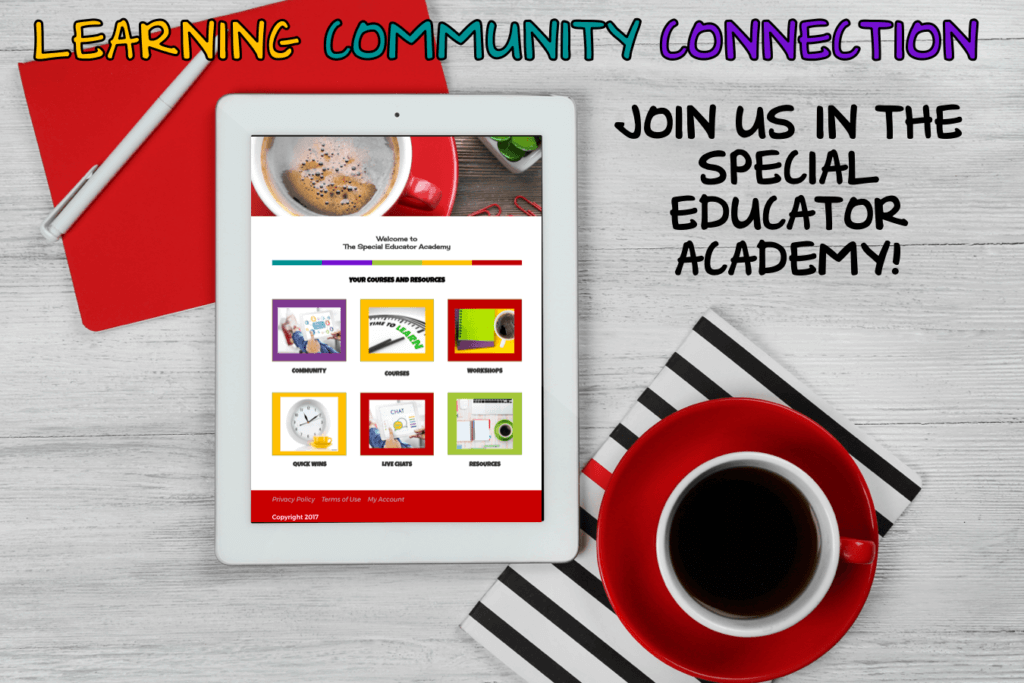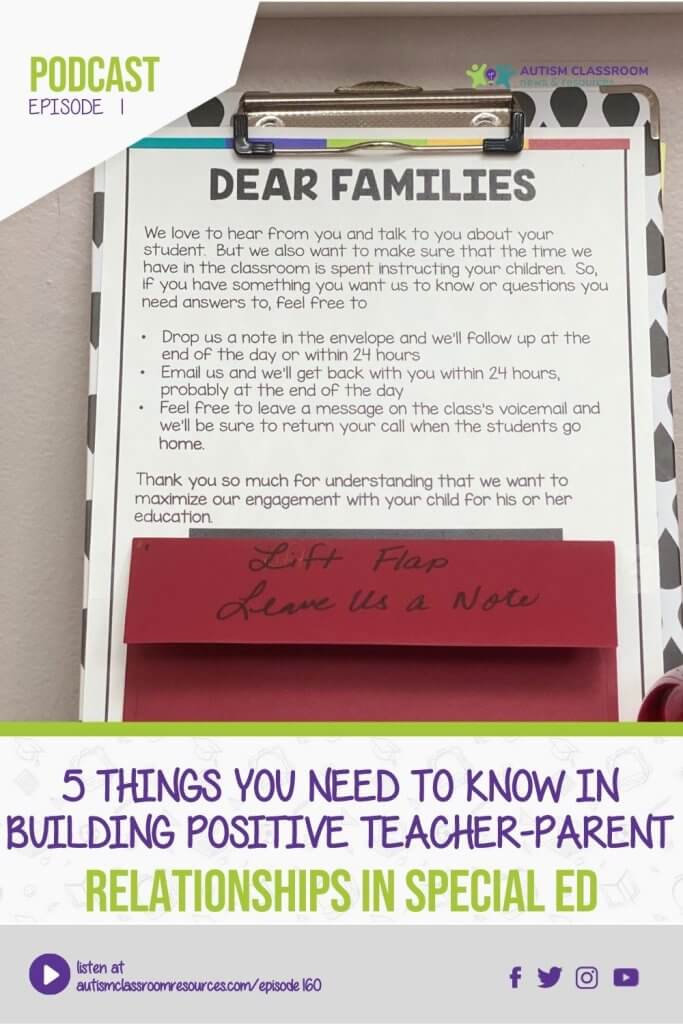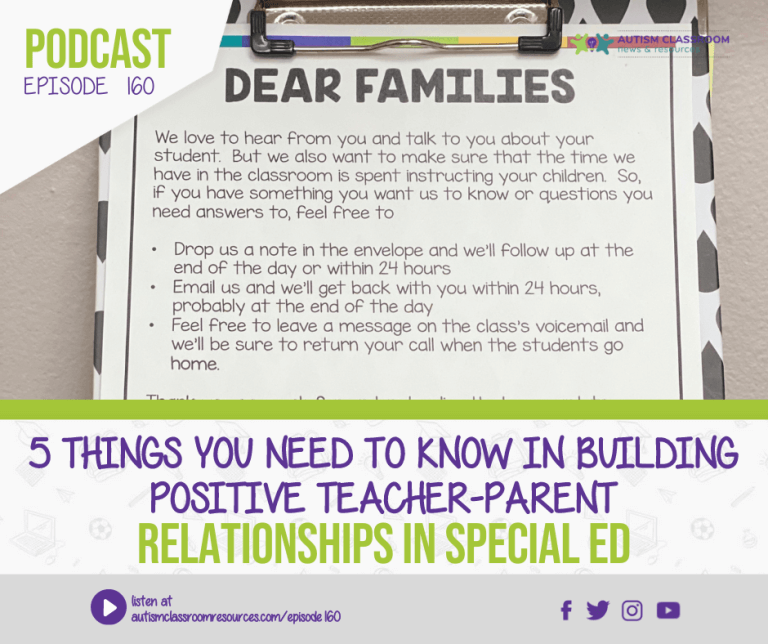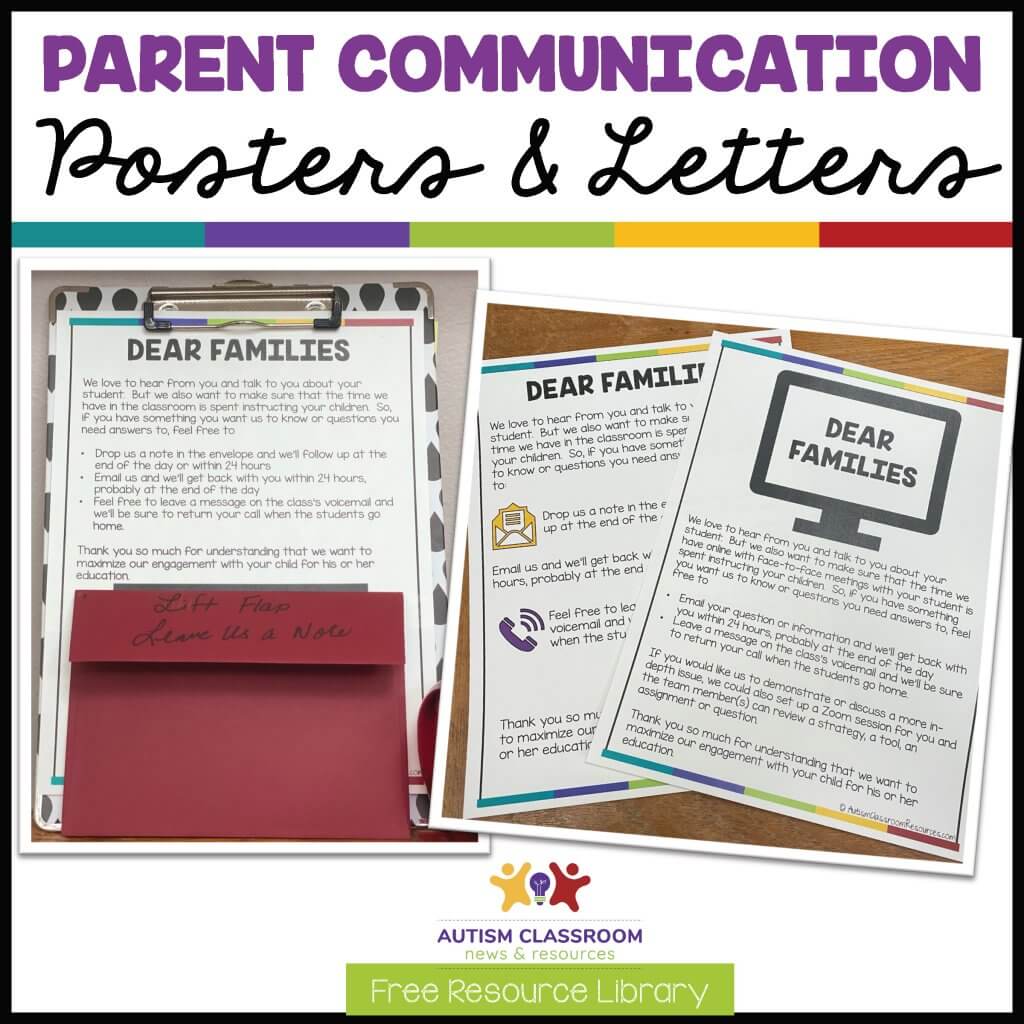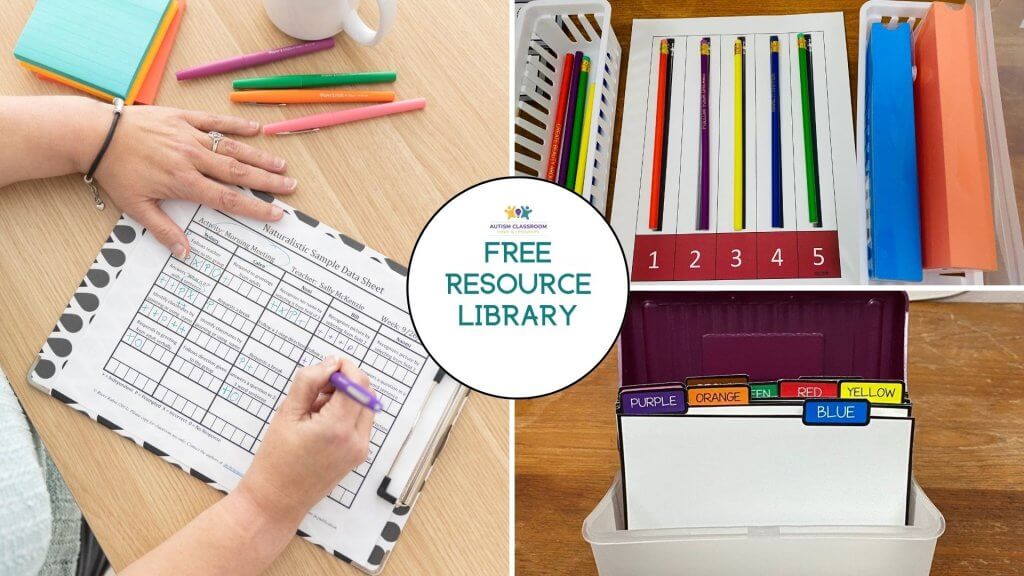Welcome to the Autism Classroom Resources Podcast, the podcast for special educators who are looking for personal and professional development.
Christine Reeve: I’m your host, Dr. Christine Reeve. For more than 20 years, I’ve worn lots of hats in special education but my real love is helping special educators like you. This podcast will give you tips and ways to implement research based practices in a practical way in your classroom, to make your job easier and more effective.
Welcome back to the Autism Classroom Resources podcast. I am Chris Reeve, and I’m your host.
And if you are listening around when I recorded this, it’s the beginning of spring. And spring always brings to mind the special extra season of the school year, IEP season. Now, I know that some of you do IEPs throughout the year. But I also know that many of you have most of your IEPs come due around this time before the year ends. And usually that’s because that’s when they’re last ones were done, or they were done before they moved to the next grade level or things like that.
So while I’m not actually talking specifically about IEP s, today, I am going to talk about how we work with families of our students. One of the biggest elements that makes IEPs go smoothly, is when there is already an established teacher parent relationship. And that’s because some trust has already been developed between the teacher and the parent that cushions some of the issues that might come up in an IEP.
But let’s face it, everything in special education goes smoother, when there is a positive teacher parent relationship. Things just are cushioned a bit by that mutual trust. The teacher parent relationship also comes into play in the CORE framework that I’ve been talking about this year. The student’s program starts with the development of the IEP. And the IEP starts with the team.
So working well with families is part of the CORE systems that are important in increasing the effectiveness of the classroom because it means there is a stronger IEP to work off of.
Being a family member myself of someone with autism with my sister, as well as having been a professional in the field for almost 30 years now, you can imagine that I have lots of points to make on this topic of parent teacher relationships. So let’s get started.
So let’s talk about building teacher parent relationships. They are essentially the heart of the educational experience for all students Special Ed, General Ed, any kind of ed. They are the point that really helps families entrust their children to schools, and allow schools to do their jobs.
And I know that parents can get frustrated when they are not feeling connected to what is happening at school. I know also that many teachers get frustrated, because the parents aren’t as engaged as they would like them to be. And everything in the parent teacher relationship has examples on both sides for positives and for negatives. I can find just as many parents who are frustrated with the teacher is I can find teachers that are frustrating for parents.
But the fact of the matter is that we are in this together. And we want to make sure that we are providing the best education that we can for the student and working with families in special education especially, is how we do that.
When teachers were trying to figure out the boundaries of the relationship with some parents who want to be involved in every single decision throughout their child’s day, and the teachers obviously are getting frustrated by that because they can’t do their jobs, I try to remind teachers of how frustrated we get when parents can’t or won’t communicate with them about their child.
What about the parents who don’t come to IEP meetings who aren’t involved? You know, we do want to be thankful when we have families that are engaged, that maybe their engagement feels a little hard at times. But in reality, we really want to make sure that we are remembering that there are both sides to this issue.
All children do better when home and school are both supportive of the child’s education. I’m not going to spend time talking about horror stories on either side today. Building a successful relationship with a parent can mean the difference between the student having a bad day and having that be a team discussion focused on problem solving, or having it be a reason for due process hearings.
I’m not saying that relationship building will prevent all kinds of problems with families. But it certainly lays the groundwork for positive, proactive strategies on both sides.
I’ve worked with districts for long periods of time. I’ve worked with families for long periods of time. And I’ve seen districts that have many different setups and structures for special ed.
And one of the times that I was really struck by the importance of a relationship with families was a district that I worked with for a long time, where the preschool speech and language pathologist was someone that had been there for many years, many of the students coming into Special Ed had initially been evaluated by her coming out in early intervention. And she became the autism support staff member district wide.
She was an amazing person, she had amazing skills. She was someone who families had been with the district for a while, many of them had gone through the difficult process of finding out that their child had a disability. This was the one of the people who often were the first person to say that to them. And consequently, because she was so strong at working with families, they had a very strong positive relationship with her.
What I found that was interesting in this situation was that, as you know, there are always years in a student’s school career where everything goes, right. And there are other years where it seems like everything goes wrong. There’s a new teacher, or there’s a lot of turnover in the classroom, or there’s just something that requires a little patience while the school gets it worked out.
These situations that we were always encountering, were so much smoother in this district, because of this autism specialist’s relationship with these families being so positive from being in the past. Often when we were talking about a high schooler, who had the parents had known her since their child was a preschooler. So that’s how strong the power of the parent teacher relationship really, really is. And I really should probably call it the parent educator relationship, because it is more than just the teacher.
The second reason why it’s so important is that many of our students have limited communication skills. They can’t go home and tell their parents what happened at school today. They can’t come to school and tell us what happened at home. Even our students who are verbal, can’t always sequence events to tell families what happened to them that day, or they’re not accurate recorders, because of the way that they use language.
That’s something that happens frequently with my sister, my sister is older now. But being able to put the steps together to tell you the story of what happened isn’t always very clear with her now even more than it ever was before, but a lot of it has to do with her communication issues. So consequently, parents are getting less feedback than they get from typical children coming home from school, and this is a big chunk of their day.
Also, with limited communication, it’s hard to support a student’s communication at school, when you don’t know what happened at home. If you know that they went to the amusement park, or they went to a festival or a carnival over the weekend, you can help them communicate that experience by having visual cues and other supports ready to help them for that. But if you don’t know where they went, you’re left guessing what they might be trying to tell you and how to support that kind of communication.
It’s also really hard to ask questions of them about anything, because they can’t give us information back. It’s also hard to teach them to ask and answer questions when we don’t know what the information is that they can give us. So when we say how was your weekend, we don’t know what the information is that we want to get back from them. You know, if I don’t know where he went over the weekend, I can’t make sure that his device and his pictures can support that answer. As a parent if I don’t know what he did at school, I can’t support his sequencing of events to tell me about it.
As I noted on a personal note, my sister with autism is verbal. She has always been able to tell us about general things that have happened but as she ages, this is becoming less and less reliable. And because it’s less reliable, it’s hard to know what is going on in the facility that she lives in.
We don’t have The relationship that many have with schools within the adult community, I don’t particularly have it with this particular facility. And so finding out what’s really going on when something happens is very difficult when I don’t have that relationship with a staff member to make those decisions, or to give it give me that information I can trust.
On the flip side, I have a friend whose adult son lives in a group home and attends a program. And we were actually touring his program the other day, for things that had nothing to do with him. And the staff wasn’t sure which room he was in that day, and each one we got sent to he was never there. And the director of the program, who has a very good relationship with his mom, came up and said, “Oh, no, we lost him. I don’t know where he is.”
Now, in my situation, if my sister’s staff came and told me that I would believe they had lost her that they had taken her someplace, they had left her somewhere, and they didn’t know where she was. Because I don’t have a strong relationship with them. In the case of my friend, the relationship was such that this was clearly the joke that it was meant to be. And yes, we did find him exactly where he needed to be. But that joke would not have worked in another situation, because it certainly wouldn’t have been funny, even if it was true.
So the third reason why it’s important to spend our time building these relationships is because of the difficulty to students with autism, and other disabilities as well, have with generalizing information that they’ve learned.
Students learn things at home, but they don’t demonstrate them at school. Children learn things at school that they don’t demonstrate at home. How many times have you sat in an IEP meeting if you’ve worked with students with autism, and the parents have said, What do you mean he can do this? He’s never done that for me. Or the school has said, What do you mean, he can do that? We don’t see that at school.
I had a student whose mom asked us why we kept working and writing her name when she already knew how to do that. She came to me one morning, and she’s like, Why do you insist on spending all the time on this when she already knows how to do this? And I was mystified because I was like, because she can’t write her name. We know she can’t write her name.
And so luckily, I was smart enough by that point in my career, to not say, I’m sorry, she really can’t do it. Because it was very tempting to say, it’s not real, like whatever you’re saying she’s doing, it’s not writing her name. What I said instead was, can you come in the classroom and show me? Can you show me what what it looks like when she writes her name? And so she did. And sure enough, if you gave this kid a green pen, she could write her name. But if he gave her any other writing utensil, she didn’t do it.
So mom was giving her a green pen, Mom didn’t realize that was significant, we’ve never given her a green pen, so she’d never demonstrated that skill for us. It’s so important to make sure that we are asking the question of what the skill looks like, how the skill happened, using similar strategies to improve that generalization, making sure we’re teaching for generalization. But part of that really does rely a lot on good homeschool communication.
The fourth reason why this relationship is so very important is for safety. And it is definitely not the fourth priority. But it is one that’s very important. It’s important to remember that families are giving up their children for six to eight hours a day, in an environment that they may not know that well.
If you have your own children think about how scary it probably was when you took them to daycare or school for the first time. Think about if you didn’t know the teacher, particularly if your child couldn’t come home and tell you about something that happened that was a problem or that bothered them at school.
Our students, regardless of their functioning levels, are particularly vulnerable to having things happening. Fostering a feeling of safety is important for our students, and it’s important for their parents. And communication and transparency is the best way to make sure that that happens.
And the fifth reason that is no less important is because it’s fifth, is that we are a team. One of the most important reasons for fostering teacher parent relationships is that there’s too much to do for one part of our team not to be talking to the other. We can’t do this alone in the classroom. Families can’t do this alone at home. We need to make sure that we’re talking to each other. We always want to bring our discussions back to how it’s all about the student, that we are all worried about or concerned or celebrating, the student.
We may disagree about how to get to our goals. But we have to recognize and be assured that every one that’s there is there because the student is the center of that discussion. That they are thinking with the student’s benefit in mind. And that is only going to be common knowledge and believed if we’ve built that relationship with families.
So in order to support the student, we have to communicate effectively. And it is a two way street. If you are a teacher, send home information about what you’re doing and seeing in class. If you are a parent send school information about medication and routine changes that might affect your child’s behavior and performance at school. And if one or the other parties isn’t giving you the communication that you need, tell them what you need. If they don’t know what you need, they’re not going to be able to provide it.
If that isn’t effective, we do have to be understanding that families have time constraints, there’s a lot going on in their households, many are trying to keep their head above water. They’re trying to make sure there’s food on the table. And we need to really keep that in mind.
Even in families that are supposedly or appear to be well to do. There may be a lot of stressors that we don’t know about. Don’t let one party’s lack of communication, be a reason for you to stop communicating. When you are a parent and you want more specific information, and you feel that you can’t get it from school, be willing to work with them on what the format will look like for that.
Because while they’re teaching your child, writing an entire diary of what they’re doing, it just isn’t possible. But it is possible to give you concrete information that you need to make decisions about what happened during the day. But if either one of us is not getting that kind of communication, we want to make sure that we take the high road, and that we know that we have done what we can do to help the student by communicating information we know is important.
Finally, please remember that not every family is at a state we’re building a relationship with teachers is their priority. Some are dealing with Maslow like concerns that take priority, as I said earlier, getting through the day keeping food on the table clothing their children. Not every family has had positive interactions with schools. And you may be paying for that to some degree. I’ve worked with a lot of schools where that’s been the case and it takes time to build this relationship. It isn’t something that just happens magically overnight.
The best advice I had in those situations is to try to find out what the problem is, if there is one, and find a way to address what the problem is.
So those are five reasons why fostering the trust and the teacher parent relationship is so very important. To help start building good communication with the families of your students, think about your homeschool communication system. Is it something that gives meaningful information? Is it getting each the party the information that each of them need?
I’m going to talk next week about homeschool communication and some things we should do and not do. But until then I’ve got a free download that you can grab as a teacher from the free resource library. It can help you to manage some of the boundaries of homeschool communication.
It came about because we, in the preschool I worked in, our families often walked their child down to the classroom in the morning. And when they did that, that was always a time that they saw the teacher and it seemed like a good time to tell the teacher what they wanted them to know or ask them questions for information that they wanted. But in reality, it wasn’t a great time because we were trying to get students engaged in activities in the classroom and the parents are still there and the teachers needed hands on at that time.
It’s a teaching time. And it’s not necessarily a great time that’s conducive to answering a lot of questions or having a conversation with three sets of parents that could take up to you know, 90 minutes.
So one of the things that we started doing was having a an envelope outside the door that parents could write notes because it was before we had a lot of the technology. And they could write a note that said please contact me and you know, I have questions about this. I have a number of different strategies that can help set those boundaries in a nice way.
This one actually includes letters and information about scheduling times to talk or to meet about when you can take phone calls, when you can respond to email, and you can grab your copy of the link in the show notes.
And you’ll find the show notes at autismclassroomresources.com/episode 160. Or you can go and also sign up at Academy.autismclassroomresources.com/library
Thank you so much for listening. I know how precious your time is, and I hope that it’s been worthwhile. If you’ve listened to the podcast and gotten something meaningful from it, I’d love for you to leave a review or just tag or DM me on Instagram @autismclassroomresources and let me know. I really would love to know if it had an impact on you.
I will be back in our next episode where we’ll be talking about tips for building homeschool communication systems that work for both sides. Until then, just remember, we are getting closer to the end of the year. Have a great week.
Thanks so much for listening to today’s episode of the Autism Classroom Resources podcast. For even more support, you can access free materials, webinars and Video Tips inside my free resource library. Sign up at autismclassroomresources.com/free. That’s F-R-E-E or click the link in the show notes to join the free library today. I’ll catch you again next week.
